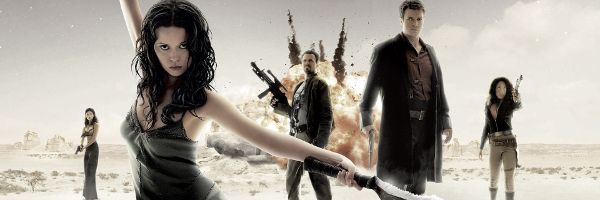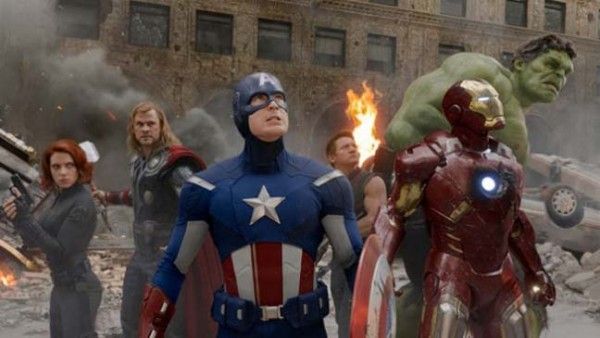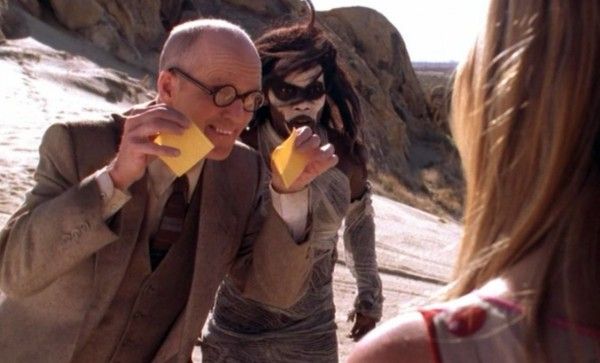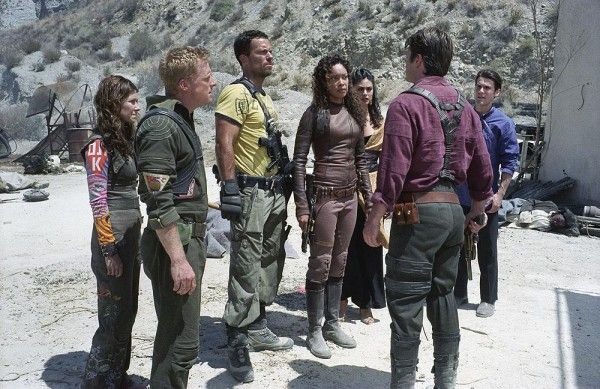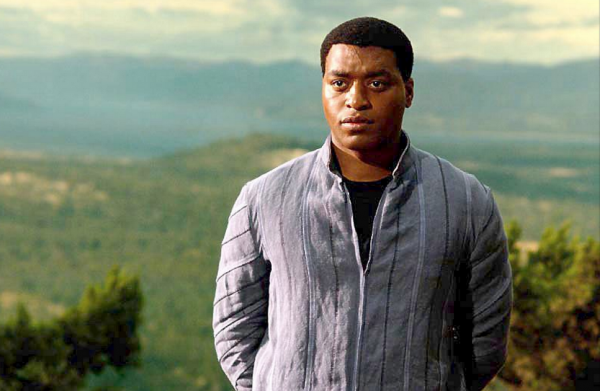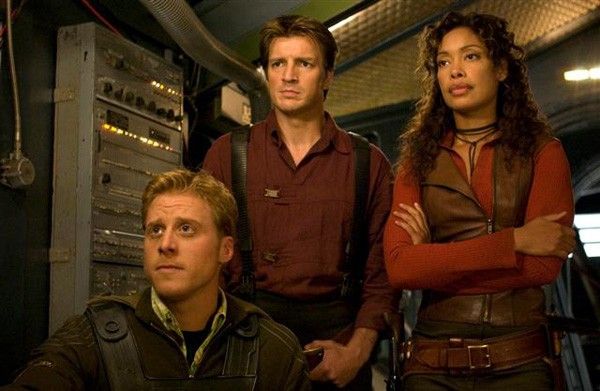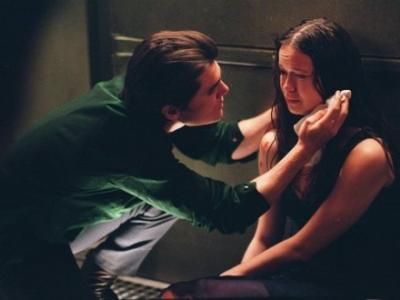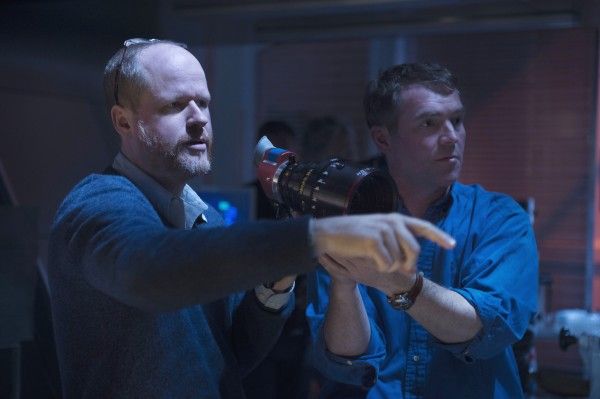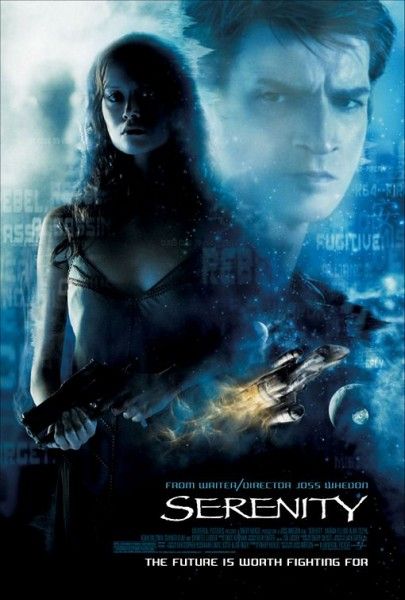Joss Whedon is the kind of writer that holds universes inside him. Whether exploring the life of a teenage cheerleader turned defender of mankind in Buffy the Vampire Slayer, the high-tech slave trade of model-hot avatars in Dollhouse, the video blog of a wannabe supervillain in Dr. Horrible's Sing Along Blog, or in the case of Firefly and its feature film sequel Serenity, a literal universe that spans to the outer-reaches of space, Whedon has a gift for building unique, fleshed-out worlds populated by fascinating characters. And equally important, he has the skilled craftsmanship required to bring those worlds to life on screen.
No doubt, it was this gift for mythic world-building that landed Whedon the seat at the helm of Marvel's game-changing Avengers franchise. To celebrate, for a moment, what Whedon pulled off with Avengers (and to a lesser extent with Avengers: Age of Ultron) it's important to remember that the ubiquitous "shared universe" mentality was not even a thing when Avengers hit theaters just three years ago. While the credit for that idea lies with Kevin Feige and the big brains at Marvel, the credit for the execution is greatly owed to Whedon.
I could sing the praises of how well Whedon accomplished that insurmountable feat for pages, but that is a different piece all together. This isn't about what he achieved with Marvel; it's about the road he traveled to get there, and why it's the right time for him to step off the massive MCU helicarrier and plant his feet firmly back in original content.
Certainly, Whedon's passion for comic books and his ties to that industry landed him the gig as a major architect of the Avengers franchise, but Marvel doesn't just hand out the keys to their mighty castle because someone is super smart and likes the subject a whole lot. Marvel needed the right person to lead the charge on their revolutionary approach to cinematic storytelling, and that required a vast and varied skill set – a gift for ensemble, an eye for action, an ear for dialogue, but most importantly, the ability to take all the worlds that were built in the preceding films, combine them, and in the process build a new shared universe in which they could all thrive. Whedon's first feature film, Serenity, demonstrated all those skills, and then some.
Based on the cancelled-too-soon space western series Firefly, Serenity follows Captain Malcolm Reynolds and his band of space-traveling renegades as they search for the secret that will topple the totalitarian interplanetary regime known as The Alliance. The world of Firefly is perhaps Whedon’s most finely-crafted universe, infused with a sense of culture that had its own history, its own laws, and its own aesthetic. Firefly also gave us one of the all time great heroes in the form of Captain Mal, a man built off the Han Solo/Indiana Jones prototype, but with a war-torn darkness and absolute leadership that makes him a man all his own. The challenge of boiling that world down to its essence is unfathomable, and the fact that Whedon pulled it off is a testament not only to his skills as a creator and storyteller, but as a filmmaker.
For the average moviegoer, Serenity was a damn good two hours in the cinema. For fans of the series, it was a hard-won moment of closure and catharsis. As one of those fans, watching Serenity in theaters was an experience of great joy and occasionally great pain (“I'm a leaf on the wind”); a subjective moment of fan-fulfillment. Looking at Serenity now, with 10 years of distance and a lot more experience, the movie is impressive to the point of being astounding. In his first go-round at the helm of a feature film, Whedon not only delivered a pitch-perfect piece of science fiction adventure, he did so in a way that obliged fans of the series while establishing a self-contained narrative. And the film has aged excellently, like a fine wine (or perhaps in keeping with the Whedonverse, a fine cheese).
Watching Serenity now, it's impossible not to marvel (no pun intended) at the level of craftsmanship on display. You see it in the very first scene. The universal logo dissolves into “Earth That Was”, which opens up to reveal River's childhood history class, which turns out to be a dream she's having in captivity, which in turn is a hologram of her escape. But this isn’t just an exercise in stylistic flourish, it’s a storytelling opportunity that establishes the unique world of Serenity in a mere matter of moments. We learn about The Alliance and their conquest of the planets, we see through the all-to-clean ethereal quality of River’s school their vision for a beautiful, peaceful world. And yet, in the scene that follows, that tidiness becomes sanitary, and we learn the dark side of the Alliance. We see Whedon’s signature distrust of centralized power -- a motif that runs through all his finest works. And yet, his nefarious structures of control are never repetitive. The Alliance is not Wolfram Hart, nor is it the mysterious corporation sending teens to their death in Cabin in the Woods. With each new world, Whedon devises an ominous authority well-met to the needs of the story.
Serenity’s narrative is tight, ratcheting up the stakes with each new scene; to the point that the final battle sees nearly every single team member dead or on the brink of death, and because you love them so much, because each is a complete human, that threat becomes devastating. The dialogue is endlessly quotable, defined by Whedon's characteristic knack for blending quips with moments of searing humanity. And while it retains enough of the series' idiosyncratic jargon to please fans, it's never enough to isolate or confuse newcomers. On top of that, Whedon needed to service a large ensemble of characters. It must have been a monstrous motherfucker of a script to write, but the payoff is abundant.
The direction is on point; from the beautiful one-er that introduces the Serenity and her crew in a single sweeping shot, to the way Whedon uses the camera to frame emotion (I'll always be a fan of the shot in which Zoe's quiet rage comes into crystal clear focus). There are also moments of subtle mirroring that carry through the script. Mal's first and final lines, "What was that?!" The synchronicity of the Reavers and the horror story behind their inception. "They never lie down," River mutters cryptically after the gang shoots down a rabid Reaver. "They didn't fall...they just lay down," echoes Inara much later in the film, after they uncover the Alliance's monstrous secret. That symmetry is seen throughout, and the most stunning, story-centric use of that technique is in the character of The Operative.
Special attention must be paid to The Operative, a one-of-a-kind antagonist and perhaps Whedon's finest villain yet (though I'll forever have a soft spot for Buffy's hidey-ho chipper Mayor). As previously demonstrated with characters like Faith, Angel, and Spike -- like the authorities, each villain is imagined and fitted precisely to the story at hand -- The Operative is a fine example of Whedon's understanding that villainy is not a natural state, but something that grows out of circumstance, environment, and most importantly in The Operative's case, belief. He is a true believer in a better world – a world in which he knows he has no place – methodical, ruthless, and disarmingly polite. In a piece of brilliant casting, Chiwitel Ejiofor brings an extra dose of charm and humility to the idealistic assassin. He is the perfectly crafted antagonist to rival Mal, not only because of his physical accumen, but because of the strong character both men posses.
But what most impresses me about The Operative is how he acts as a dark mirror to Shepherd Book. The mystery of Book's past tormented fans of the series, and while none of our questions were given hard answers in Serenity, you needn't dig too deep to gain some enlightenment through the character of The Operative. Shepherd Book, who always knew a little too much about The Alliance, who always hinted at a dark past, and who, like The Operative, valued belief above all. Is it too much of a stretch to concieve that The Operative, his illusions shattered, would carry his guilt and his faith into a lifetime of service a la Book? Is it too much to infer that before his acquiring his peaceful ethos Book's passionate faithfulness may have served a more sinister cause? The characters are inverted mirrors of each other, each allowing the other to be understood more clearly, and in turn we understand the world they inhabit. Through these two characters, Whedon paints the audience a picture of the cost in living in The Alliance’s universe.
These are only snippets, favorite moments culled from the exceptional storytelling on parade in Serenity. Whedon's world-building skills are on full-blast as he crystallizes the vast universe of Firefly to its essence, pulling salient points into a cohesive standalone entry. There’s no denying that Serenity is a richer experience for fans of the series. We walked in knowing all the pieces to see the puzzle more clearly. But even for the casual viewer, all the key elements that made Firefly an unprecedented work in science fiction are laid out -- The Alliance’s dictatorial rule over the 'verse, Mal's war record, his brothers-in-arms bond with Zoe, Kaylee’s longing for Simon, Mal and Inara’s turbulent relationship, the fearsome savagery of the Reavers, Jayne’s self-serving nature, Shepherd Book’s mysterious past. Every piece of Firefly’s universe is there in its most direct form. It’s impressive enough that Whedon has it in him to continually create such intricate worlds, to build ensembles of such zany, differing characters, but to condense that range into a single motion picture requires an extra skills. And Whedon pulls it off without relying lengthy exposition. Instead, it’s all spelled out through snippets of dialogue and moments of action.
Indeed, it's Whedon's talent for conveying character through action that keeps the final act of the film, a solid half-hour of action that packs set-piece upon set-piece, from dissolving into a mind-numbing slog of explosions and gunfire. The mid-budget effects do little to carry the weight; though they are well-designed and enthusiastic, they are undeniably rough. To quote our fearless Captain, it's love that keeps it afloat. In this case, it’s Whedon's love for his characters. Every one of them walks into the last stand with an established history behind them and a unique motive ahead. And those motives play into the wide spectrum of humanity Whedon built with this singular cast of characters. No one fights for the sake of fighting. Zoe fights to grieve. River fights to protect. Kaylee fights to get something 'twixt her nethers weren't run on batteries. And Mal, who loves to tussle just because, finally fights because he has something worth believing in. The physical stakes are high, but the emotional stakes are higher, and that makes every battle, every set piece, more engaging than the last.
And now to the unavoidable topic of conversation: Will there be more Firefly? Listen closely enough on any given day and you’ll hear the call of the Browncoats, clamoring for a return to the world of Captain Mal and his troupe of renegade space travelers. What started as a space western series on FOX, grew into a feature film, and has since grown into a wildly impassioned, and equally vocal fandom. A fandom that is renowned for incessantly pleading for more. And hey, that worked for us with Evil Dead, who’s to say it won’t work here. And yet, as always, there seems to be no budge.
It’s certainly strange that in our age of streaming-service resurrections, crowdfunding, and revival series that arguably the most desired reunion of all time seems so unlikely. Even stranger is the fact that most of the cast are still friends — a huge amount of them rallied to participate in Alan Tudyk’s fan-funded series Con Man — and Whedon has gone on record saying this is the crew he’d love to reunite with more than any other. Sure there are a few logistical problems — some confusion about the rights (FOX owns the series while Universal owns the film), the fact that most of the key players are continuously booked on other TV gigs (Fillion has Castle, Baccarin has Gotham, Baldwin has The Last Ship, Torres had Suits, Glau had Arrow, etc.), but enough time has passed to see scheduling conflicts come and go, while demand for the further adventures of the Serenity crew has never waned.
Perhaps the most likely obstacle to a Firefly redux is simply that Whedon either hasn’t cracked a story he likes enough to rally the troops again, or, as he’s indicated in past interviews, he’s ready to write something entirely new. And that may be the greater gift. Don’t get me wrong, like any die-hard Firefly fan, I’d love to see more, but what Whedon accomplished with Serenity was an act of graceful closure. Unlike Dollhouse, which suffered a roughshod conclusion that felt wanting, Serenity was a meticulously articulated ending that left no character journey unresolved. If the fates decide that we must leave it here, there's a peace in knowing it ended well.
Whedon's next project is a mystery. After dropping off the face of social media (your twitter is missed, by the way), he's stayed well out of the sights of inquiring minds like mine, committed to some well-earned R&R. You need look no further than the Age of Ultron press rounds to see the toll the gargantuan Marvel films took on him. But when he is well-rested and decides to work again, it's my greatest hope that he will invest his time in something new, something original, and if his track record is any indication, something extraordinary.
If Whedon has more worlds tucked away in his mind, and it's impossible to believe that he does not, those are worlds I want to see, worlds I want to visit. If he has more characters in mind he has yet give a voice to, those are voices I want to hear, characters I want to meet. If he has more genres to bend, I say bend them. I think I speak for a metric fuckton of people when I say I'm anxiously awaiting word. No pressure though.

